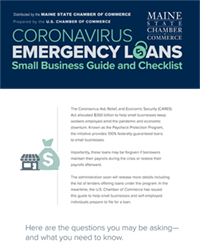
|
The Daily
Edition for Monday, March 30, 2020 |
To view this in your browser, click here. |
|
Welcome to your daily Impact newsletter! |
|
As a valued member of
the Maine State Chamber of Commerce, we plan to stay in touch with you every
afternoon, through emails like this one and on Facebook and Twitter, until the pandemic passes. We
intend to provide you with the latest state and federal information, as well
as highlighting the creativity and innovation that is occuring here in Maine
during this unpredictable and rapidly changing time. To assist you in
navigating the uncertainties ahead, we have created a diverse and
comprehensive collection of web-based resources to help you take care of yourself and your family, your employees, your business, and your community. If there is anything you need, please reach out. |
|
We are here to help in any way we can! |
|
Maine small businesses
encouraged to prepare now to access federal emergency loans in CARES Act $350 billion
allocated to keep workers employed during pandemic |
|
|
On Friday, March 27, 2020, the
U.S. Congress passed, and the President of the United States signed, the
Coronavirus Aid, Relief, and Economic Security (CARES) Act. As part of the
$2.2 trillion stimulus funds included in the CARES Act, $350 billion is allocated
to help small businesses. Known as the "Paycheck Protection Program," and
co-sponsored by Sen. Susan Collins, small businesses that maintain their
payroll during the COVID-19 pandemic will be able to apply for 100% federally
guaranteed emergency loans. These loans may be forgiven if borrowers maintain
their payrolls during the crisis or restore their payrolls afterward. Loans
can be up to 2.5 times the borrower's average monthly payroll costs, not to
exceed $10 million. A list of lenders offering loans
under the program is expected to be announced soon, after which businesses
and self-employed individuals can begin applying for loans directly with a
lender. Until that time, The Maine State Chamber of Commerce with the U.S.
Chamber of Commerce is sharing details of the
CARES Act with business owners and encouraging them to prepare now to
apply. |
|
|
"The rescue funding in the Paycheck Protection Program of the CARES Act is critical to keeping Maine's small businesses operating during this time and keeping Maine's workforce whole," said Maine State Chamber of Commerce President Dana Connors. "We strongly encourage Maine businesses to prepare now to take advantage of these loans. These loans will help them endure the pandemic and help mitigate its impact on Maine's economy." Businesses and 501(c)(3)
organizations with fewer than 500 employees are eligible to apply for the
emergency loans. Also eligible are sole proprietors, independent contractors,
self-employed individuals who regularly carry on any trade or business,
tribal business concerns that meets the SBA size standard, and 501(c)(19)
veteran organizations that meet the SBA size standard. For businesses in the
accommodation and food services sector (NAICS 72), the 500-employee rule is
applied on a per physical location basis. For businesses operating as a
franchise or receive financial assistance from an approved Small Business
Investment Company, the normal affiliation rules do not apply. The
500-employee threshold includes all employees: full-time, part-time, and any
other status. In evaluating eligibility, the
CARES Act directs lenders to consider whether the borrower was in operation
before February 15, 2020 and had employees for whom they paid salaries and
payroll taxes or paid independent contractors. Lenders will request a good
faith certification that the uncertainty of current economic conditions makes
the loan request necessary to support ongoing operations, and that the
borrower will use the loan proceeds to retain workers and maintain payroll or
make mortgage, lease, and utility payments. A personal guarantee is not
required for the loan, nor is collateral. A lender will not consider whether
the borrower sought and was unable to obtain credit elsewhere. A borrower is eligible for
loan forgiveness equal to the amount the borrower spent during the 8-week
period beginning on the date of the origination of the loan on the following
items: payroll costs, interest on the mortgage obligation incurred in the ordinary
course of business, rent on a leasing agreement, payments on utilities, and
for borrowers with tipped employees, additional wages paid to those
employees. A guide and checklist to
prepare businesses to apply for a Paycheck Protection Program CARES Act loan
can be found on the Maine State
Chamber of Commerce's website. Detailed COVID-19 information and resources for
employers and employees are regularly updated. |
|
|
Connecting with Maine's Congressional
Delegation |
||
|
|
This week, the Maine State Chamber
of Commerce is meeting with U.S. Senator Susan Collins and U.S. Senator Angus
King to discuss the recently-passed $2.2 trillion COVID-19 relief bill. We
look forward to providing you with more valuable resources and information
during this extremely difficult time. |
|
|
U.S. Department of Labor
updates Q&A on First Coronavirus Response Act |
|
Over the weekend, the U.S.
Department of Labor added additional Questions and Answers to its Families
First Coronavirus Response Act: Questions and Answers. The updated Q&As address
many key questions, including the following: * If my employer closes my worksite on or
after April 1, 2020 (the effective date of the FFCRA), but before I go out on
leave, can I still get paid sick leave and/or expanded family and medical
leave? * When does the small business exemption apply
to exclude a small business from the provisions of the Emergency Paid Sick
Leave Act and Emergency Family and Medical Leave Expansion Act? * Who is a "health care provider" who may be
excluded by their employer from paid sick leave and/or expanded family and
medical leave? * Who is an emergency responder? * Do I qualify for leave for a COVID-19
related reason even if I have already used some or all of my leave under the
Family and Medical Leave Act (FMLA)? * If my employer reduces my scheduled work hours, can I use paid sick leave or expanded family and medical leave for the hours that I am no longer scheduled to work? |
|
|
Daily Briefing from the
Maine CDC |
|
Dr. Nirav Shah held his daily Maine CDC briefing today, sharing much data and information. He expressed thanks to Maine's health care workers for everything they are doing right now. "As thousands of people are staying home, healthcare workers are doing the exact opposite. They are reaching to the front lines to care for those in need." This weekend, Maine recorded its second and
third COVID-19 related deaths. Currently, the Maine CDC has documented 275
cases of COVID-19 across state, an increase of 22 since yesterday. Of those,
49 have been hospitalized and 41 have recovered and been released.
Additionally, approximately 43 of these cases are healthcare workers, and the
average age of those testing positive is 55 years old. In past 48 hours, the
first case has been documented in Somerset County, and there are now 12 in
Penobscot County. These cases may represent community transmission in
Penobscot but that is unclear until the investigation is complete. The Maine CDC is concerned about congregate
settings - from nursing homes to shelters or any situation where large number
of individuals live closely - and the spread of the virus. They are aware of
several congregate setting cases - six in Falmouth, three in Freeport, and
some in Leeds. Data shows that COVID-19 spreads very quickly in this type of
setting. Therefore, when Maine CDC learns of a case within this type of
congregate setting, it first notifies the facility and conducts a field
study. The CDC then asks facility to let all members, staff, stakeholders, and
family members to be notified. These communities are also asked to restrict
or disallow community visitation, to look for symptoms, to focus on
sanitation, and to maintain a daily checklist. Lab testing across state has seen more than
6,000 negative tests. Labs are still dealing with testing backlogs and
looking at new equipment. Maine CDC is purchasing a new platform that would
allow testing capacity, despite nationwide shortages of specific chemicals. As
of this morning, the Maine CDC has enough capacity to perform approximately
2,000 tests. Currently, the backlog for patients most at risk is cleared, as
is the backlog for those in healthcare. Italy and China data has shown that
health care workers were more at risk. Increase in the number of cases is concerning,
but it is also consistent with increases other states have seen. Testing has
increased significantly, and community transmission is beginning to be seen.
The recent increase in Penobscot County's cases leads the Maine CDC to wonder
if this is because of community spread. At this point, the increase in cases
is likely a factor of both community spread and increased testing. There are 176 total ICU beds in the state, of
which 92 are available. There are 253 available ventilators of 309 total.
Alternate ventilators were recently approved by the FDA and Maine CDC is
currently aware of 87 such ventilators. As Maine CDC continues to track these
items, this visibility into the data helps with load balancing across state. Additionally,
they have increased the request for additional ventilators from 300 to 400. Approximately a week ago, Maine received its
first distribution of Personal Protective Equipment, and a second shipment
arrived a few days ago. It is likely that the third shipment will arrive by
this evening, but this third shipment may be the last case of PPE that Maine
receives for quite some time. The Maine CDC is pursuing other avenues to
procure and produce other PPEs, adding that to its inventory and beginning
distribution. Procurement of PPEs is a problem because there is no system
nationally to do so, so essentially that leaves states pitted against each
other to try and procure PPE. The state is looking into the feasibility of
manufacturing capacity in Maine. DECD Commissioner Heather Johnson and her
team are helping the CDC to work with companies across the state to try and
ramp up PPE production here. The University of Maine System is also involved
in these discussions. We are not yet at a place where we can determine our
capacity but "the response from the manufacturing community has been
extremely positive." Maine has not received the same share of PPEs as other
states have. In the meantime, Maine is pursuing additional strategies to
procure what we need. The Maine CDC is using two different types of
modeling currently to determine where we will head - Epidemiological models
take what we know about disease and how it spreads; and "best fit"
modelling which uses data from the outbreak in Wuhan and adapts it for
different conditions. The Maine CDC takes different models and do projections
based on our healthcare parameters and on lowest and highest projections. Ultimately,
the more aggressively we can physically distance now, the better. Conversely,
the less we physically-distance now, the more we will have to do so later. |
|
|
Federal Update: Trump
extends virus guidelines, braces U.S. for big death toll |
|
On Sunday, President Trump extended
the voluntary national shutdown through April 30. The initial 15-day
period of social distancing urged by the federal government expires today,
March 30. President Trump had expressed interest in relaxing the national
guidelines at least in parts of the country less afflicted by the pandemic.
Many states and local governments have stiffer controls in place on mobility
and gatherings. The federal guidelines recommend against large group
gatherings and urge older people and anyone with existing health problems to
stay home. People are urged to work at home when possible and avoid
restaurants, bars, non-essential travel and shopping trips. Dr. Anthony Fauci said at Sunday's briefing that the U.S. could experience more than 100,000 deaths and millions of infections from the pandemic. Extension of the guidelines recognizes that the struggle will take place over the longer haul and the risk of deaths spiraling into the hundreds of thousands is real. The U.S. had more than 139,000 COVID-19 cases reported by Sunday evening, with more than 2,400 deaths. During the course of Sunday's briefing, reported deaths grew by several dozen and the number of cases by several thousand. |
|
The Radio Replay from
March 30, 2020 |
|
|
Early this morning, Dana Connors spoke with WGAN's Matt Gagnon about the federal CARES Act. The $2.2 trillion federal financial assistance package will bring much-needed resources to employees and employers nationwide during and beyond the COVID-19 crisis. |
|
Governor Mills Signs
Executive Order to Fast Track Free Online Job Training at Maine's Community
Colleges |
|
Order allows for greater flexibility to train workers
online for critical jobs needed to address the effects of COVID-19 On Monday, March 30, Governor
Janet Mills signed
an executive order allowing Maine Quality Centers (MQC) to swiftly
address the changing demands in Maine's job market due to widespread economic
disruption caused by the 2019 novel coronavirus (COVID-19). Governor Mills'
order suspends certain restrictions, on an as-needed basis, on job training
funds managed by the Maine
Community College System's MQC program. Suspending those restrictions,
such as eligibility and employer matching funds, gives the MQC program more
flexibility to rapidly provide free online training to people who have been
displaced by the recent effects of COVID-19. Maine Quality Centers is working closely with workforce training professionals at all seven of Maine's community colleges across the state to develop and implement free online training programs. MQC is coordinating its efforts with the Department of Labor and other workforce agencies for the recruitment and screening of participants in the new online programs. |
|
To unsubscribe, click here. |
Notice: In an ongoing effort to thwart
the activities of online hackers, the Maine State Chamber |





